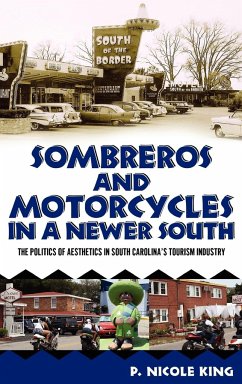How South of the Border and Atlantic Beach reflect cultural shifts in a more inclusive South In 1949 Alan Schafer opened South of the Border, a beer stand located on bucolic farmland in Dillon County, South Carolina, near the border separating North and South Carolina. As tourist traffic grew, the stand developed a faux Mexican border town theme featuring kitsch souvenirs such as sombreros, toy piñatas, and vividly colored panchos. Within five years, the beer stand had grown into a restaurant, then a series of restaurants, and then a theme park, complete with gas stations, motels, a miniature golf course, and an adult-themed shop. Flashy billboards--featuring South of the Border's stereotypical bandito, Pedro--advertised the locale from hundreds of miles away. An hour south of Schafer's site lies the Grand Strand region--sixty miles of South Carolina beaches and various forms of recreation. Within this region, Atlantic Beach has been a primary tourist destination for African Americans since the 1940s, as it was one of the few recreational beaches open to them. Since the 1990s, the beach has been home to the Atlantic Beach Bikefest, a motorcycle festival event that draws thousands of African Americans and other tourists annually. Sombreros and Motorcycles in a Newer South studies both locales to illustrate how they serve as lenses for viewing the historical, social, and aesthetic aspects embedded in a place's culture over time. In doing so, author P. Nicole King develops the concept of the "Newer South," the contemporary era of southern culture that integrates Old South and New South history and ideas about issues such as race, taste, and regional authenticity. Tracing South Carolina's tourism industry through these places, King analyzes the collision of southern identity and place with national and global commercial culture from the 1940s onward. P. Nicole King, Baltimore, Maryland, is assistant professor of American studies at the University of Maryland, Baltimore County, and director of the Orser Center for the Study Of Place, Community, and Culture. Her work has appeared in the edited collection Dixie Emporium: Consumerism, Tourism, and Memory in the American South.
Hinweis: Dieser Artikel kann nur an eine deutsche Lieferadresse ausgeliefert werden.
Hinweis: Dieser Artikel kann nur an eine deutsche Lieferadresse ausgeliefert werden.








